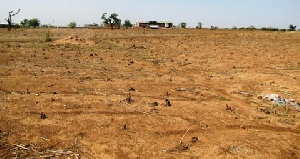The Center for Climate Change and Gender Studies of the University of Energy and Natural Resources (UENR) is implementing US$3,880 project to mitigate the impact of climate change and improve on food productivity in the Sunyani West District.
The four-year project- “building and appreciating farmers knowledge and innovative strategies towards food security”, is funded under the Climate Impact Research Capacity and Leadership Enhancement in Sub-Saharan African Programme (CIRCLE).
CIRCLE is an initiative of the Department for International Development (DFID) of the United Kingdom to develop the skills and research output of early career African researchers in the field of climate change and its local impact on development.
The project, expected to end in July is being implemented in 12 communities – Kwatire, Chiraa, Odumase, Bofokrom, Mantukwa, Ayakomaso, Asuakwa, Attakrom, Nsoatre, Tanom, Kobedi and Dumasua.
At a learning platform organized for beneficiary farmers in Sunyani, Dr Mrs Mercy Afua-Adutwumwaa Derkyi, the Acting Head for the Center, said the impact of climate change was well felt not only in the project implementing district, but Brong-Ahafo Region in general.
She therefore stressed the importance to strengthen research capacity on climate change mitigation, harness it in the service of policy planning and making for sustainable development.
Mrs Derkyi, who is a Senior Lecturer at the Department of Forest Science, said collective approach was required in climate change mitigation and called for effective collaboration between the Forestry Service Division, Cocoa Board, Meteorological Agency and all relevant institutions toward climate change mitigation.
She expressed appreciation to the DFID for funding the project, which she added was making significant impact in the implementing communities.
In a speech read for him, Mr Martin Obeng, the Sunyani West District Chief Executive, said the impact of climate change threatened food security, and advised farmers in the area to take advantage of the Planting for Food and Jobs programme and register to expand their farming activities.
He said the programme remained a laudable government intervention to create jobs and increased food production, but added that until farmers develop interest and enrolled, the programme would not make any meaningful outcome.
Mr Obeng commended the University and its partners for the Project and expressed the hope that more of such programmes would be enrolled to create opportunities for farmers to upgrade their knowledge in contemporary methods of farming.
Professor Emmanuel Opuni-Frimpong, the University’s Pro Vice Chancellor, advised the farmers to apply the knowledge they had acquired through the project to attain meaningful results.
General News of Tuesday, 29 May 2018
Source: ghananewsagency.org

















